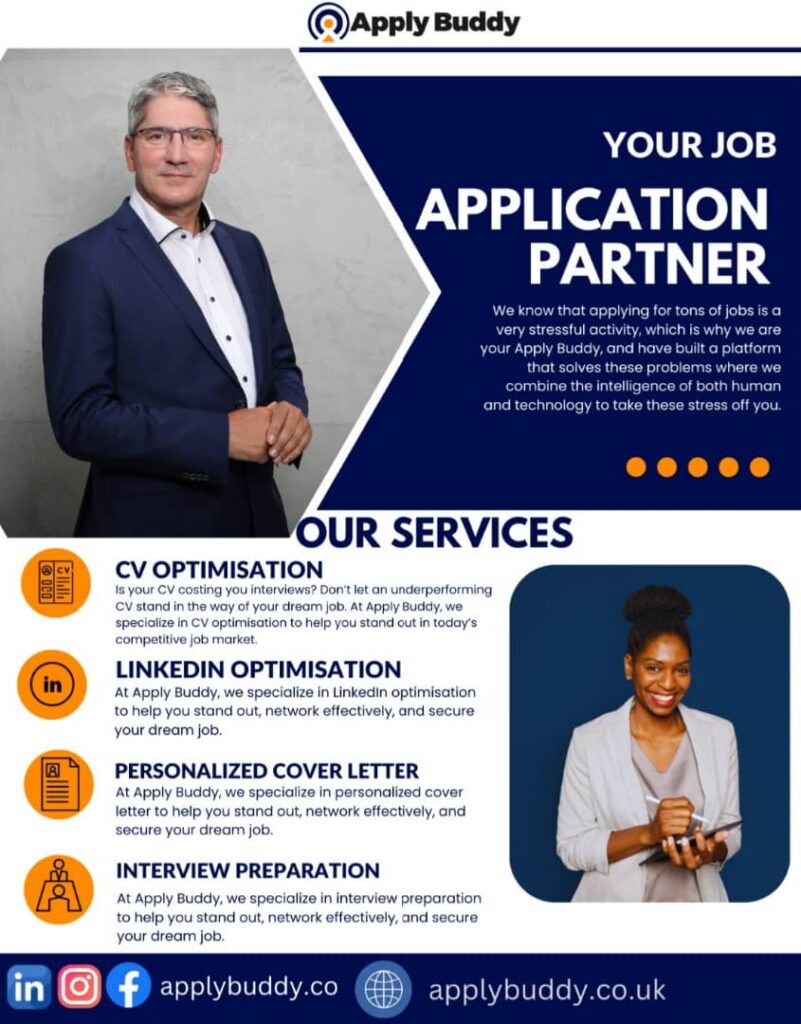How to overcome rejection in UK job applications is one of the most essential skills you’ll develop in your career journey.
If you’ve ever felt the sting of an “unfortunately” or never-heard-back email, you’re not alone, and more importantly, you can emerge stronger.
In this article, I’ll walk you through why rejection is so common in the UK market and what you can do immediately after a rejection.
My goal is to help you turn rejection into fuel, not a stop sign.
Why Rejection is a Common Part of the UK Job Market
The UK job market is fiercely competitive, especially in major cities like London, Manchester, and Edinburgh. That means even qualified candidates face rejection.
69% of UK people professionals said talent competition increased in 2024.
To understand how to overcome rejection in UK job applications, you need to see how systems, competition, and external factors work against you, but also how you can adjust.

The competitiveness of roles in major UK cities
In major UK cities, competition for professional roles is exceptionally high. Employers often receive hundreds of applications for a single vacancy. This makes it difficult for even highly qualified candidates to stand out.
This means rejection is not necessarily a reflection of your skills but rather the volume of competition. Understanding this helps you manage expectations and remain objective when evaluating outcomes.
Recognising that rejection often stems from saturation rather than inadequacy is the first step toward maintaining confidence.
How applicant tracking systems (ATS) can filter candidates
One of the biggest unseen challenges in how to overcome rejection in UK job applications is the role of Applicant Tracking Systems (ATS). These automated systems scan CVs for keywords that match the job description before a human ever sees them.
Industry analyses report that over 98% of Fortune 500 companies used a detectable ATS in 2024, meaning the software first screens many CVs.
Many applicants get filtered out simply because their CVs aren’t optimised for these algorithms. To improve your odds, ensure that your CV uses relevant keywords and proper formatting.
Avoid graphics or unusual fonts that can confuse scanners. A clear, keyword-rich CV that aligns with UK hiring standards can help you bypass ATS filters.
Economic and industry-specific factors influencing hiring decisions
In times of economic uncertainty or industry restructuring, employers often tighten budgets or pause hiring altogether. Some sectors, like technology and finance, experience fluctuations that impact recruitment volume.
This means rejection may not be about your suitability but timing. Staying informed about market shifts through platforms like the Office for National Statistics or LinkedIn Labour Market Insights can help you target growing industries.
By aligning your skills and applications with areas of expansion, you reduce rejection risk and position yourself where demand is highest.
Read also:
Immediate Steps to Take After a Job Rejection
Learning how to overcome rejection in UK job applications also means knowing what to do right after receiving disappointing news. The moments following rejection can determine how quickly you recover and refocus.
By acknowledging your feelings, gathering feedback, and adjusting your approach, you transform rejection into a strategic opportunity for growth and improved job readiness.
Acknowledge the disappointment, but don’t dwell
Rejection stings, but acknowledging your disappointment is healthier than ignoring it. Allow yourself a short period to process your emotions. Whether through reflection or talking it out with a trusted friend.
However, don’t allow that disappointment to linger. Once the initial feeling fades, remind yourself of your strengths and past achievements. Everyone faces rejection at some point; it’s part of professional growth.
Reframe the experience as a lesson rather than a loss. The sooner you regain focus, the faster you can redirect your energy toward the next opportunity.
Request feedback from the employer
After rejection, one of the most constructive steps you can take is to request feedback. In the UK, many employers are open to sharing insights on why you weren’t selected, especially after interviews.
This feedback can highlight areas for improvement in your CV, cover letter, or communication style. Approach the request professionally. Thank them for considering your application and express your interest in future opportunities.
Even brief feedback can offer perspective and direction for your next steps. Implementing this advice will strengthen your strategy and demonstrate professionalism.
Reflect on your performance and application
Reflection is an essential part of learning how to overcome rejection in UK job applications. Instead of fixating on what went wrong, analyse each stage of your application process.
Did your CV clearly match the job requirements?
Were your interview answers specific and confident?
Did you research the company thoroughly?
Identifying gaps helps you improve future applications and get hired faster. Keep a record of each rejection to track recurring themes. This could reveal patterns in feedback or areas needing improvement.
Over time, your applications will become sharper and more aligned with employer expectations.
Update your CV and cover letter based on insights
Once you’ve reflected, use your insights to update your CV and cover letter. Tailor both documents to match specific job descriptions, highlighting measurable achievements and relevant skills.
Consider using professional CV templates aligned with UK standards. If you’ve received feedback about presentation or tone, incorporate those improvements immediately.
This proactive approach signals adaptability and growth, qualities UK employers admire. By continuously refining your materials, you enhance your competitiveness and demonstrate commitment to professional development.

Transform your UK job search with Apply Buddy, your ultimate job application partner.
With tailored packages and expert guidance, Apply Buddy helps you turn rejections into job offers and land your dream role faster.
Shift Your Mindset to See Rejection as Redirection
A key part of learning how to overcome rejection in UK job applications is changing how you perceive rejection.
Instead of viewing it as a failure, recognise it as a form of redirection. An opportunity guiding you closer to roles that better fit your skills, personality, and career aspirations.
Focus on what you gained from the application process
Every application provides value, even if it ends in rejection. You gain insights about industry expectations, company culture, and the types of roles that align best with your background.
By analysing what you’ve learned, new interview techniques, better CV formats, or stronger self-presentation, you ensure that no effort is wasted. This perspective transforms the job search into a process of ongoing self-improvement.
When you appreciate the growth behind each attempt, you’re not starting over each time; you’re building upward.
Track small wins
When job searching, progress isn’t always about securing the job. It’s also about the milestones along the way. Keep track of small victories like being shortlisted, receiving a callback, or completing an interview confidently.
These wins show that your strategy is improving and that you’re moving closer to your goal. Celebrate them as signs of progress rather than mere steps.
Over time, this record becomes tangible proof of your growth and persistence. Tracking progress keeps motivation high and prevents discouragement after setbacks.
Reframe “no” as “not yet”
A rejection doesn’t necessarily mean “never”; often, it just means “not yet.” Timing plays a significant role in hiring, and you might be the perfect fit for a similar opportunity later.
Maintaining professionalism and leaving a positive impression can lead to future consideration. Some employers revisit previous applicants when new roles open. By reframing “no” into “not yet,” you protect your confidence and continue moving forward.
Developing patience and a long-term vision is essential for mastering the art of overcoming rejection in UK job applications with optimism and persistence.
Read also:
Strengthen Your Job Application Strategy
Another critical step in mastering rejection in UK job applications is strengthening your strategy.
By refining your CV, optimising your LinkedIn profile, and practising interviews. You increase your chances of making a lasting impression on employers and improving outcomes with every submission.
Tailor each CV and cover letter to UK job specs
Customisation is key to a strong application. Employers in the UK value relevance and precision, so tailor each CV and cover letter to the specific job description. Mirror the language and keywords used in the advert. Emphasise skills and experience directly aligned with the role.
This approach signals that you understand the employer’s needs. Avoid sending the same CV repeatedly; it reduces impact. The extra effort pays off with higher response rates and better interview chances.
Align your LinkedIn profile with your CV
Your LinkedIn profile is often the first impression employers see. Ensure it aligns with your CV in tone, content, and achievements. Recruiters frequently cross-check details between both, so consistency builds trust.
Use a professional headshot, add measurable results, and engage in relevant discussions within your industry. Highlight endorsements and recommendations to enhance credibility.
When your digital presence supports your written application, you project confidence and reliability. Maintaining this alignment forms a key component for a cohesive and professional personal brand.
Practice competency-based interviews
In the UK, competency-based interviews are a standard hiring approach. Employers assess how you’ve demonstrated specific skills in past roles using the STAR method:
Situation, Task, Action, and Result.
To prepare, identify examples that reflect core competencies such as teamwork, communication, and leadership. Practising these responses improves confidence and clarity.
Recording yourself or rehearsing with a friend can also help refine delivery. Understanding the interview format ensures you’re not caught off guard and can articulate your experiences effectively.
Use mock interviews and professional feedback
Mock interviews provide a low-pressure environment to practise and receive feedback before the real thing. Many UK job centres and career services offer free or affordable mock interview sessions.
They help you identify weak areas, such as nervous habits, career gaps, or unclear answers, so you can improve before facing an employer. Seek professional guidance where possible; career coaches can provide insights into industry-specific expectations.
Reviewing your performance afterwards helps reinforce lessons learned. Over time, you’ll feel more comfortable, articulate, and confident in your responses.

Boost Confidence and Stay Motivated
Resilience is a cornerstone of learning how to overcome rejection in UK job applications. Maintaining motivation through challenges requires support, balance, and self-care.
By connecting with others, managing stress, and investing in continuous growth, you’ll stay mentally strong and ready for new opportunities.
Join UK-based job seeker support groups
Support groups, both online and offline, can make a huge difference when dealing with rejection. Platforms like LinkedIn, Facebook, and Meetup host UK-based job seeker communities where members share advice, leads, and encouragement.
Surrounding yourself with people who understand the job market helps normalise rejection and boost morale. You’ll find motivation through shared experiences and practical tips that strengthen your strategy.
Engaging in group discussions can also open networking opportunities, which are often key to landing roles.
Read also:
Speak to a mentor or career coach
Mentorship can provide invaluable guidance during your job search. A mentor or career coach offers perspective, accountability, and encouragement when facing setbacks. They can identify skill gaps and suggest actionable improvements for your applications and interviews.
Many UK professionals volunteer as mentors through networks like Career Ready or LinkedIn. A fresh, experienced perspective can illuminate opportunities you might overlook.
When navigating rejection, having someone in your corner makes the journey less discouraging. This personal support plays a vital role in sustaining long-term motivation.
Take a break when needed – your mental health matters
Job searching can be exhausting, and constant rejection can take an emotional toll. Sometimes the best way to move forward is to step back briefly. Taking breaks helps reset your perspective, allowing you to return refreshed and motivated.
Use the time to focus on activities that nurture your well-being, such as exercise, hobbies, or social time. Remember, mental health is as vital to professional success.
Protecting your mental health is integral to mastering how to overcome rejection in UK job applications and maintaining your drive for success.
Upskill through free online courses or workshops
Continuous learning is an excellent way to rebuild confidence after rejection. The UK offers a wealth of free or affordable online courses through platforms like RKY Careers and Coursera.
Upskilling demonstrates adaptability and commitment to growth, qualities highly valued by employers. Whether you’re enhancing digital literacy or leadership skills, every course adds to your professional value.
This approach turns rejection into motivation for self-improvement. Integrating new skills into your CV and interviews also makes future applications stronger.
When to Pivot Your Job Search Approach
Sometimes, mastering how to overcome rejection in UK job applications means recognising when to adjust your direction.
Changing industries, exploring freelance work, or expanding your search geographically can open unexpected opportunities and help you gain valuable experience.
Consider alternative roles or industries
If repeated rejections occur, it might be time to explore new directions. Many transferable skills can apply across industries, from communication and project management to problem-solving.
For instance, moving from retail management to operations or administration can broaden your prospects.
Conduct research to identify growing sectors in the UK, such as renewable energy or digital marketing.
Knowing when to pivot is essential for overcoming rejection in UK job applications and aligning your skills with evolving job market demands.
Explore internships or freelance work for experience
Internships and freelance projects offer valuable experience and help you build credibility between full-time roles. Many professionals in the UK use short-term contracts or part-time opportunities to gain exposure and expand their portfolios.
Freelancing platforms such as Upwork and Fiverr can provide income while strengthening skills relevant to your field. Internships, even unpaid ones, demonstrate initiative and commitment to growth.
They often lead to networking opportunities and permanent positions. Using these experiences strategically enhances your employability and fills gaps in your CV.
Expand your search outside London and major cities
Many UK job seekers focus on London, but opportunities exist across the country. Cities like Leeds, Bristol, and Glasgow have thriving industries and lower levels of competition.
Expanding your search geographically can uncover hidden roles and increase your chances of success. Relocation or remote work options are increasingly common, offering more flexibility in your job search.
Exploring smaller markets can also provide a better work-life balance and new professional networks. Broadening your horizons is an effective way to discover opportunities beyond traditional hotspots.
FAQs: How to Overcome Rejection in UK Job Applications
Is it okay to apply to the same company again after rejection?
Yes. If the role changes or a fresh opportunity arises. Wait 6–12 months, improve your application and qualifications, then reapply.
How long should I wait before reapplying?
Aim to wait at least 6 months, or after major updates (skills, roles, certifications). That gives you time to grow, refresh your profile, and avoid seeming repetitive.
What if I never hear back from employers in the UK?
Don’t take silence personally. Many UK firms don’t respond due to volume. Keep applying, tailor each application, network within the company, and ask contacts for referrals.
Should I follow up after a rejection?
Yes, politely and briefly. Thank the interviewer, ask for feedback, and express continued interest in future roles. A short, positive message leaves a good impression.
